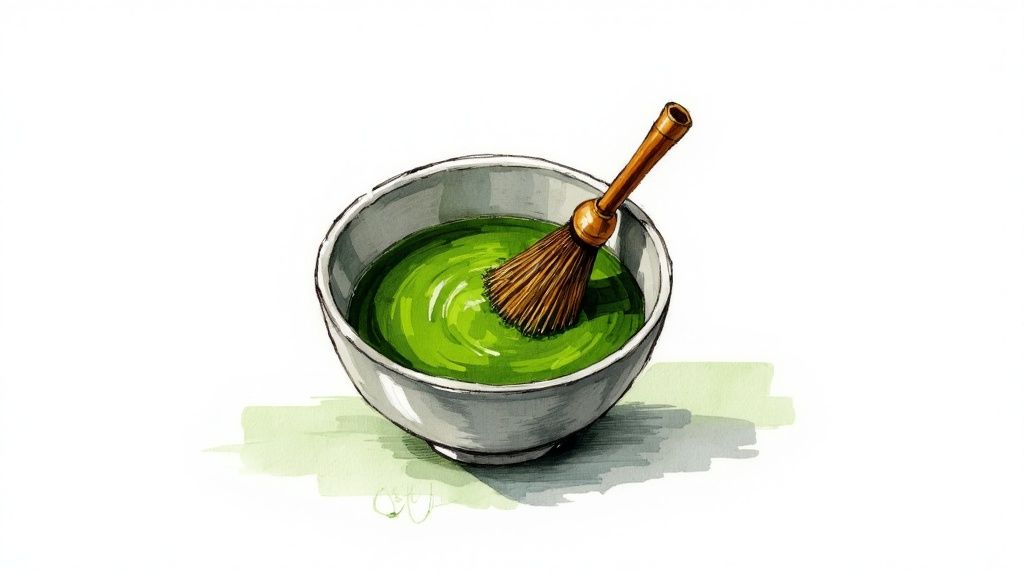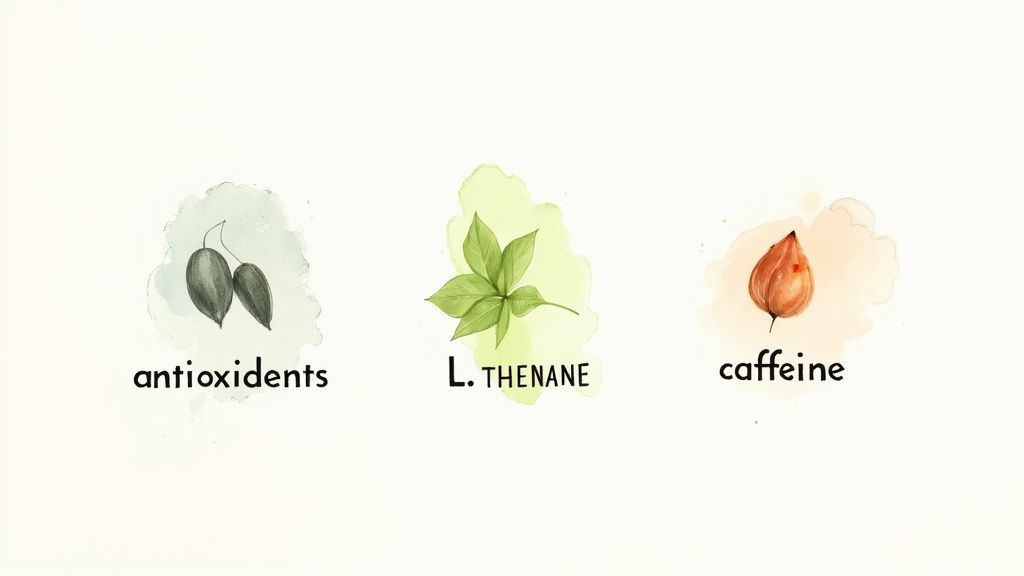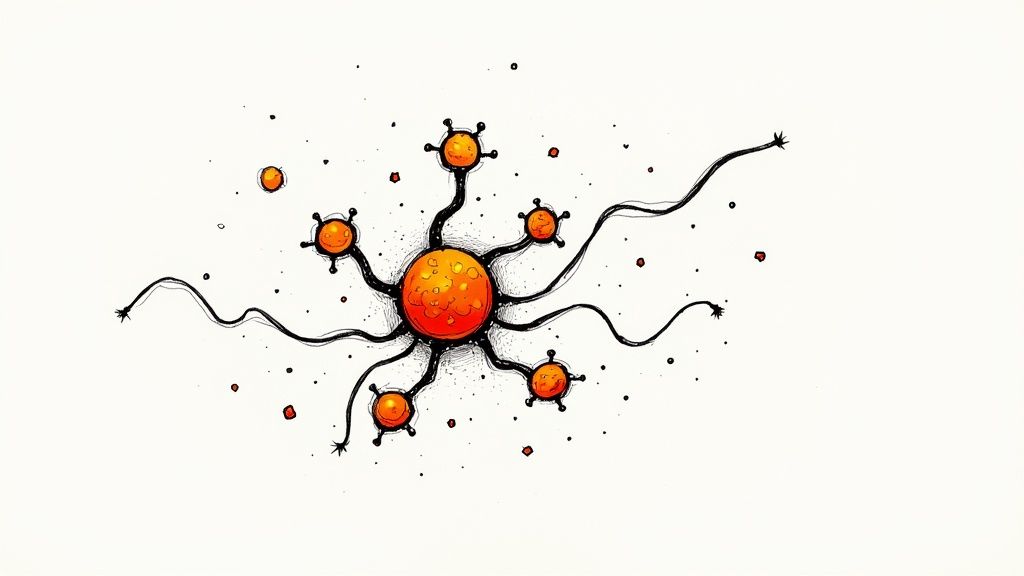Introduction to Matcha

Matcha, a vibrant green powder, stands apart from other teas. It's a unique elixir with a rich history and a wealth of health benefits. Originating in Japan, matcha has been consumed for centuries, initially prized for its role in traditional tea ceremonies. This finely ground powder, derived from specially cultivated green tea leaves, offers a concentrated source of beneficial compounds that set it apart from regular steeped green tea.
Think of it like this: imagine juicing an orange versus eating orange slices. Both provide nutrients, but the juice offers a quicker, more potent delivery of vitamins and antioxidants. Similarly, matcha delivers a more concentrated experience compared to traditional green tea, leading us to explore the remarkable health benefits that have brought this ancient beverage into the modern wellness spotlight.
From Tradition to Trend: Understanding Matcha's Origins
Matcha’s evolution from an ancient ritual to a modern superfood is a captivating story. For centuries, Buddhist monks in Japan valued matcha for its ability to enhance focus and promote a calm alertness during meditation. This practice cemented matcha’s place in traditional Japanese tea ceremonies, where it became a symbol of mindfulness and tranquility.
Today, matcha's popularity has exploded beyond cultural boundaries, appreciated worldwide for its distinctive flavor and impressive range of health benefits. This growing awareness has led to a surge in matcha-infused products, from lattes and smoothies to baked goods and even skincare. However, the real essence of matcha remains in its pure, powdered form, allowing for the greatest absorption of its beneficial compounds.
Matcha Health Properties: A Deeper Dive
So, what makes matcha so special? The key lies in its unique cultivation process. Weeks before harvest, matcha tea plants are shaded. This encourages the plants to produce more chlorophyll and amino acids, particularly L-theanine. As a result, matcha has its vibrant green color, and importantly, many of its sought-after health benefits.
For instance, L-theanine works synergistically with the caffeine naturally present in matcha to promote sustained energy without the jitters or crash often associated with coffee. Furthermore, matcha is packed with antioxidants, specifically catechins, which are essential for protecting the body against cell damage and potentially reducing the risk of chronic diseases. This powerful combination of antioxidants, L-theanine, and caffeine positions matcha as a potent ally for both physical and mental well-being, setting the stage for a closer look at the specific ways matcha can benefit your health.
Nutritional Profile
The unique combination of antioxidants, L-theanine, and caffeine significantly contributes to matcha’s celebrated health benefits. But to fully appreciate its advantages, we need to understand its complete nutritional profile. This means delving into the specific vitamins, minerals, and other bioactive compounds found in this exceptional green powder.

A Rich Source of Vitamins and Minerals
Matcha boasts an impressive array of vitamins and minerals that support overall health. It's a good source of Vitamin C, known for its immune-boosting properties, and Vitamin A, which is crucial for eye health. Matcha also contains B vitamins, which play a key role in energy production and nerve function. These vitamins work together within the body, contributing to optimal cellular function and overall vitality. Therefore, adding matcha to your diet can help address various nutritional needs and support many aspects of your health.
The Powerhouse of Antioxidants
Matcha’s exceptional antioxidant content is one of its most celebrated features. It's particularly rich in catechins, plant compounds with potent antioxidant activity. One specific catechin, epigallocatechin gallate (EGCG), is found in particularly high concentrations in matcha. EGCG is known for its ability to neutralize harmful free radicals, which protects cells from damage and may reduce the risk of chronic diseases.
Think of antioxidants as tiny defenders shielding your body against cellular invaders. They help prevent oxidative stress, a process likened to internal rusting, and contribute to long-term health and well-being. This potent antioxidant capacity makes matcha a valuable addition to any health-conscious diet.
Beyond Vitamins and Antioxidants: Other Beneficial Compounds
Vitamins and antioxidants certainly contribute to matcha's health benefits, but other beneficial compounds play a role, too. Matcha contains chlorophyll, the pigment that gives plants their green color. Chlorophyll is associated with several health benefits, such as detoxification and wound healing. In addition, the amino acid L-theanine, as mentioned earlier, promotes relaxation and mental clarity without drowsiness. This means matcha can offer a calm and focused energy boost, unlike the jitters sometimes experienced with coffee.
The unique blend of these compounds contributes to the numerous health benefits linked to matcha consumption. Understanding matcha's full nutritional profile helps us explore its specific effects on various aspects of health, from boosting cognitive function to supporting metabolic health.
Health Benefits
Understanding matcha's potent nutritional profile naturally leads us to explore its remarkable health benefits. The unique combination of vitamins, minerals, antioxidants, and other bioactive compounds contributes to matcha’s positive impact on many aspects of health. These aren’t just ancient claims; modern science is increasingly validating the traditional beliefs surrounding matcha’s beneficial properties.
Boosting Your Body's Defenses: Antioxidant Power
Matcha's antioxidant capacity deserves special attention. As a rich source of catechins, it offers powerful antioxidants that combat free radicals. Free radicals are unstable molecules that can damage cells, contributing to aging and disease. Antioxidants, like those in matcha, neutralize these free radicals, acting as a protective shield for your cells. This antioxidant power underpins many of matcha’s health benefits. For example, research suggests that the high concentration of EGCG in matcha might help protect against certain chronic diseases.
Matcha and Your Metabolism: A Dynamic Duo
Matcha’s health benefits go beyond antioxidant protection; they also extend to supporting metabolic health. Studies indicate that matcha may boost metabolism, which could potentially aid in weight management. This may be attributed to the combined effect of caffeine and EGCG, which may work together to increase energy expenditure and fat burning. While matcha isn’t a magic weight-loss solution, it can be a helpful addition to a healthy lifestyle, like a reliable partner in your pursuit of well-being.
A Calm and Focused Mind: Matcha's Cognitive Benefits
Matcha’s health properties also have a significant impact on cognitive function. Matcha contains L-theanine, an amino acid that promotes relaxation and mental clarity. Remarkably, L-theanine works in harmony with the caffeine in matcha to create a unique state of calm alertness. This allows you to experience sustained energy without the jitters or anxiety often associated with coffee. It's like having a gentle guide leading you to a state of focused tranquility. This combination makes matcha a great choice for enhancing concentration and supporting cognitive performance.
Beyond the Basics: Exploring Further Matcha Health Properties
While matcha’s core benefits center on antioxidant power, metabolic support, and cognitive enhancement, research continues to uncover other potential advantages. Preliminary studies suggest that matcha may positively impact heart health, liver function, and even skin health. These findings highlight the ongoing exploration of matcha’s therapeutic potential, further establishing its status as a powerful superfood. For example, matcha's potential to lower LDL cholesterol and improve blood flow could contribute to a healthier cardiovascular system. This expanding understanding of matcha's diverse benefits encourages continued research and investigation into its potential to promote overall wellness.
Incorporating Matcha into Your Daily Routine
Understanding matcha’s health properties is the first step. The next is finding ways to incorporate this beneficial beverage into your daily life. Matcha's versatility makes it easy to add to smoothies, lattes, and even baked goods. However, the traditional preparation – whisking the powder with hot water – allows you to appreciate its pure, earthy flavor and maximize its health benefits. This ritualistic preparation can also be a mindful moment, connecting you to the centuries-old tradition surrounding this remarkable tea. By incorporating matcha into your routine, you can unlock its potential to support your well-being and experience the transformative effects of this ancient green elixir.
Antioxidant Properties

No discussion of matcha’s health properties is complete without a closer look at its antioxidant power. Antioxidants are crucial for protecting our bodies from the harmful effects of free radicals. These unstable molecules, if left unchecked, can cause oxidative stress, contributing to cell damage and increasing the risk of chronic diseases. Think of it this way: if our bodies are like apples exposed to air, antioxidants are the lemon juice preventing them from browning. Fortunately, matcha is full of these protective compounds.
Catechins: Matcha's Antioxidant Superstars
Matcha’s vibrant green color suggests its rich chlorophyll content, but it’s the potent catechins that truly distinguish it as an antioxidant powerhouse. Catechins are plant compounds with powerful antioxidant properties, and matcha boasts a much higher concentration than regular green tea. This is partly due to the unique shading process the matcha plants undergo before harvest. Shielding the leaves from direct sunlight increases the plant’s production of chlorophyll and, crucially, catechins. This means a single serving of matcha delivers a concentrated dose of these beneficial compounds.
EGCG: The Champion Catechin
Among the catechins, one stands out: epigallocatechin gallate, or EGCG. EGCG is particularly abundant in matcha and is known for its ability to neutralize harmful free radicals. It's like a highly skilled defender in your body’s defense system, actively fighting off cellular damage. The impressive levels of EGCG contribute significantly to many of matcha’s health benefits, including its potential to support healthy aging and protect against certain diseases. This makes matcha a valuable part of any diet focused on long-term health and well-being.
Beyond EGCG: A Synergistic Blend
While EGCG plays a key role, the other catechins in matcha also contribute to its overall antioxidant power. These compounds work together, creating a strong defense against oxidative stress. Other antioxidants present in matcha, such as vitamins A and C, further enhance these protective effects. It's this combination of various antioxidants that gives matcha its remarkable ability to support overall health. For instance, vitamin C helps regenerate other antioxidants, ensuring a continuous cycle of protection. This complex network of antioxidant activity highlights matcha’s profound impact on well-being. This understanding of matcha’s antioxidant properties sets the stage for exploring its specific benefits related to mental clarity and focus.
Mental Benefits

Our exploration of matcha's health benefits naturally leads us to its effects on cognitive function. Beyond its physical advantages, matcha offers a unique combination of compounds that can significantly impact mental clarity, focus, and overall cognitive performance. This makes matcha an attractive alternative to coffee for those seeking sustained energy and enhanced mental acuity.
A Symphony of Calm and Focus: The Matcha Advantage
The key to matcha's mental benefits lies in the synergistic relationship between L-theanine and caffeine. L-theanine, an amino acid primarily found in tea plants, promotes a sense of calm and relaxation without causing drowsiness. Caffeine, of course, is a well-known stimulant that enhances alertness and focus. When combined, as they naturally are in matcha, these two compounds create a harmonious balance—a state of relaxed alertness. This means you can experience improved focus and concentration without the jitters, anxiety, or sudden energy crash often associated with coffee. It's like having a clear, steady stream of energy flowing through your mind, enabling you to navigate tasks with greater ease and efficiency. This unique combination is one of matcha's most celebrated properties.
Enhanced Concentration and Attention: Matcha as a Cognitive Enhancer
Numerous studies suggest that matcha can significantly improve cognitive function. The unique combination of L-theanine and caffeine works to enhance attention, memory, and reaction time. This means that including matcha in your routine could lead to better performance at work, improved academic focus, and enhanced clarity in everyday life. Imagine tackling a complex project with a newfound sense of mental clarity and sustained focus. Matcha can be a valuable tool, helping you stay sharp and productive throughout the day. This natural cognitive boost is one of the key reasons for matcha's growing popularity among students and professionals.
Mood Elevation and Stress Reduction: Matcha for a Balanced Mind
Matcha's health properties go beyond focus and concentration, extending to mood regulation and stress management. L-theanine has been shown to promote alpha brain waves, which are associated with a state of relaxed alertness. This can help reduce feelings of stress and anxiety, fostering a sense of calm and well-being. Matcha also contains small amounts of other compounds that might have mood-boosting effects. This means that enjoying a cup of matcha can be a simple yet effective way to manage daily stress and promote a more balanced emotional state. It’s like incorporating a mini-meditation break into your day, allowing you to find moments of tranquility amidst the demands of modern life. These mood-enhancing effects further contribute to matcha's overall positive impact on mental well-being.
Beyond the Immediate: Long-Term Cognitive Health with Matcha
While the immediate cognitive benefits of matcha are impressive, the potential long-term advantages are equally compelling. The potent antioxidants in matcha, particularly EGCG, may play a role in protecting brain cells from damage and reducing the risk of age-related cognitive decline. This means that incorporating matcha into your lifestyle could be a proactive step towards supporting long-term brain health and cognitive function. It's like investing in the future of your mental well-being, helping ensure your mind stays sharp and resilient for years to come. This protective effect reinforces matcha’s value in maintaining cognitive vitality throughout life.
Conclusion
This exploration of matcha’s health benefits reveals a remarkable synergy of elements contributing to its potential to boost well-being. From its rich history rooted in Japanese tradition to its modern-day status as a superfood, matcha offers a compelling story of health and wellness. We’ve examined its unique cultivation process, exploring how shading the tea plants enhances the production of beneficial compounds like chlorophyll and L-theanine. This understanding highlights why matcha surpasses regular green tea in its concentration of these vital nutrients.
Recap of Matcha's Key Health Advantages
Let's recap the key takeaways regarding matcha's health benefits:
- Potent Antioxidant Power: Matcha’s high concentration of catechins, especially EGCG, provides exceptional antioxidant protection, fighting free radical damage and supporting cellular health. This antioxidant prowess is fundamental to its many benefits.
- Metabolic Support: Studies suggest matcha can boost metabolism, potentially aiding in weight management. The combined effects of caffeine and EGCG may enhance energy expenditure and fat burning.
- Cognitive Enhancement: The synergistic relationship between L-theanine and caffeine in matcha promotes a unique state of calm alertness, enhancing focus, concentration, and overall cognitive performance.
- Mood Regulation: L-theanine’s ability to promote relaxation and reduce stress contributes to matcha’s mood-enhancing effects, fostering a sense of calm and well-being.
These benefits, combined with potential advantages for heart and liver health, position matcha as a holistic approach to wellness. It's not just about isolated improvements but a cascade of positive changes throughout the body.
Embrace the Power of Matcha: A Path to Wellness
Adding matcha to your routine isn’t just about adding another drink; it's about embracing a mindful approach to health and well-being. Whether you enjoy it as a traditional tea, blend it into a smoothie, or incorporate it into your favorite recipes, matcha offers a versatile and delicious way to support your overall health. Its earthy flavor and vibrant green color enhance any beverage or dish. By understanding and utilizing these matcha health properties, you can unlock the potential of this ancient green elixir and begin a journey toward a healthier, more vibrant you.
Ready to experience the transformative power of matcha? Visit matcha-tea.com to explore a world of matcha, from its cultural significance to its diverse culinary applications. Discover premium matcha products, insightful articles, and inspiring recipes that will help you incorporate this remarkable tea into your everyday life. Click here to begin your matcha journey: https://matcha-tea.com
